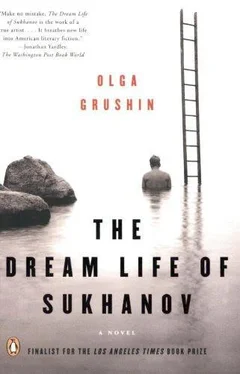Without warning the train pulled to a screeching stop. As Sukhanov toppled forward, his glasses plunged off his nose and were instantly lost amid the shuffling of uprooted feet. Immediately everything started to float away into a fog: the cloudy faces grimacing around him, the spectral station whose black-lettered name he squinted at hopefully but was unable to read, the shimmering glow of the sky above a distant town. After a moment of agonized indecision, he crouched down and groped along the filthy floor, the muddy shoes, the flabby convexities of bags, until, against every law of probability, just as the train jolted into motion again, his fingers closed on the welcome cold of the metal frames.
Infinitely relieved, he returned his glasses to their place, only to discover, upon straightening up, that half of his world was now crisscrossed by a radiant, trembling cobweb: a star-shaped crack, the imprint of someone’s vengeful step, had shattered the left lens. The crack splintered the light into dozens of cubist fragments and imparted a rainbow-tinted brightness to one side of his vision, granting unwitting haloes to a night brigade of women in orange overalls who were presently illuminated by the flickering beams of their flashlights on a parallel track, and, once the last vestiges of the unknown town had fallen into the darkness, endowing his own reflection in the window with the multifaceted eye of an insect and sending silver waves across that of a strikingly beautiful girl who had just passed behind him in the aisle.
Greedily he looked at this newly altered universe, drinking in the colors, storing up his impressions, so that at the end of the day he could unburden his fresh load of discoveries onto yet another canvas. For months after that Picasso exhibition in October of 1956, he lived as if in an experimental laboratory of art, his mind always dissecting his surroundings in search of compositions, his hands always stained by oils, his heart always on fire. There were other shows as more and more paintings crossed the loosened borders or escaped the moldering walls of Soviet prisons of forbidden creation—among them, French impressionists whose sun-spotted gardens, twirling parasols, and boating excursions he found simple but dear, and contemporary Americans whose abstract expressionism amused him with its cult of anti-art. He devoured everything he came across, and in his paintings copied, toyed with, and abandoned a multitude of techniques and styles. And all the while, my soul longed to pass through its appointed period of apprenticeship and, emerging tempered by its trials yet in essence unchanged, devise a language all its own.
For the moment, however, my search remained a private one, transpiring on a secret plane parallel to my official, seemingly unaltered, existence. Although I talked freely among my artist friends at Yastrebov’s evenings, the exhilarating change in the air felt all too recent, the memories of the preceding years all too fresh, and I preferred to be careful. I still proclaimed the virtues of socialist realism in my lectures at the institute, churned out now and then the odd portrait for the leather-bound office of some factory director, and when a shrill-voiced girl stood up during a classroom discussion and denounced Picasso as a scion of capitalism, I thought it prudent not to object. For the same reason, I had chosen to paint my true works at home, while reserving the studio (visited by both my students and my superiors) exclusively for my torpid public productions. And thus it was that I had nothing to show her when she came by the institute one dazzlingly blue, gloriously fragrant, excruciatingly awkward afternoon.
The month was March, the year 1957. Since our unfortunate meeting that past September, when I had so grossly insulted her father to her face, I had glimpsed her only a few times, always in Lev Belkin’s company, always from afar. I had not hoped to talk to her ever again. By now, Lev and I had grown so close that I considered him my best friend, but our almost daily contacts centered on our work, and the name of Nina Malinina never entered our conversation. I assumed he was in love with her, and attributed his silence to his private nature, or else to his innate sense of tact—for the impression she had made on me that ill-fated evening must have been apparent to everyone. For myself, I fervently continued to think of her as my unattainable ideal, and was reduced to near-stuttering when, after a cursory knock on my door, she walked into my life, the smells of melting snows in her wake.
“I came to see Lev, but he is busy with some students, so I thought I’d stop by here in the meantime,” she said without a smile. “I’m curious to see the works of a man who deems himself so superior to my father.”
That day, a portrait of a heavily decorated general with bushy whiskers was drying against a wall, while on my easel an uncommonly rosy-cheeked woman was proudly displaying a bucket of cucumbers. As she circled the room, she did not speak, but I saw her eyebrows rise, and my heart ached with humiliation. At the same time, I sensed it would be dangerous to tell her about my other, experimental, paintings, for she was the daughter of Pyotr Malinin, that pillar of officialdom, and I knew nothing at all about her—nothing except that she was beautiful, luminously, piercingly beautiful, moving lightly through the air alive with sunshine in that pearl-gray coat of hers, in those little black boots clicking so haughtily against the floor, her short hair the color of honey spilling in two or three curls from under a red beret, her transparent eyes distant, almost derisive, her lips—her lips—
“This isn’t really what I do,” I heard myself saying recklessly. “I have other kinds of things at home. I… I can show you if you like. I live nearby. With my mother.”
I was certain she would say no at once, but she appeared to hesitate.
“I’ll ask Lev to join us,” I added hastily.
In silence, she pulled at the fingers of her glove, then, looking up, said, “All right.” Astonished, humbled, joyful, I ran down the hall, tenderly depositing in my memory the last, expectant look of her suddenly darkened eyes. Lev’s door, around the corner, was cracked. I saw him standing by an open window, gazing into the glistening yard; his students must have just left. He did not hear me approach, and I was about to call out to him—but my lips moved wordlessly and my shout died an unnatural death in my throat. For a minute I lingered in the corridor, looking at his tall, broad-shouldered silhouette pasted against the pale blue sky; then, deciding, I retraced my steps on tiptoe.
She was still there, waiting quietly, twirling the glove in her hand.
“He’s too busy to come,” I told her. “Of course, I understand if you don‘t—”
I could not read her expression. Then, abruptly, she laughed.
“No, let’s go,” she said brightly. “Take your scarf, it’s colder than it looks.”
The city was streaming, dripping, splashing around us, sailing away on a dancing wave of early spring. She walked through it heedlessly, without noticing the torrents running off roofs and the pools of water at her feet; and so unreal seemed her presence next to me that I almost expected her to melt at any instant into the lustrous air. Yet after a mortifying interval filled with our passage through a littered building entrance, her stumbling on an unlit staircase landing, my embarrassed tugging at a key that had stuck in the lock (followed by a frantic dash into the apartment ahead of her, to throw a blanket over one painting I did not want her to see), and a blundering introduction to my startled mother who had exited the bathroom in curlers—there she was at last, standing in the middle of my cluttered room, uneasily playing with her gloves.
Читать дальше








![Theresa Cheung - The Dream Dictionary from A to Z [Revised edition] - The Ultimate A–Z to Interpret the Secrets of Your Dreams](/books/692092/theresa-cheung-the-dream-dictionary-from-a-to-z-r-thumb.webp)



